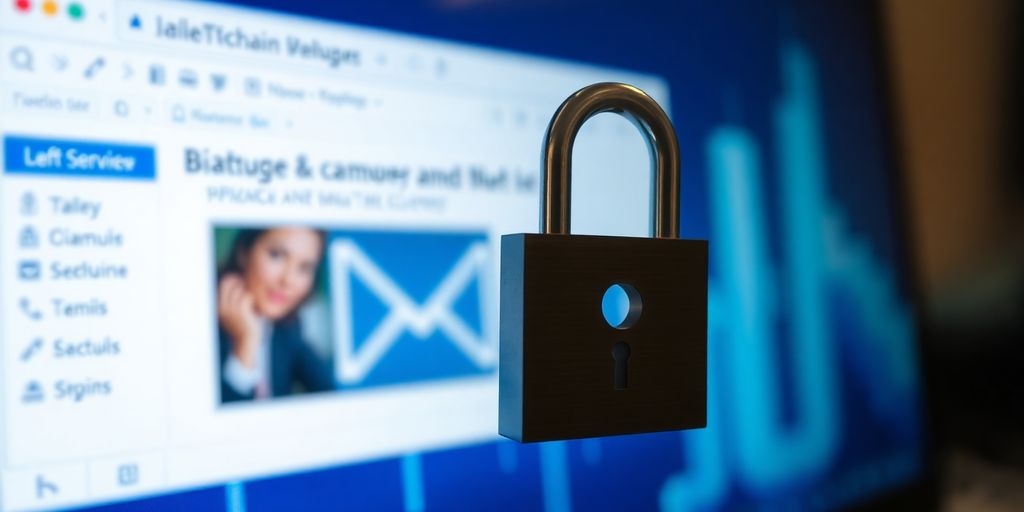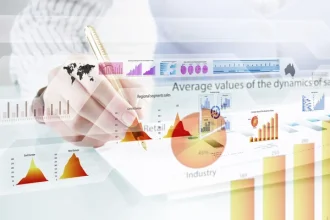In today’s digital age, email is a vital part of how we communicate. However, traditional email systems come with significant security risks and privacy concerns. Enter the blockchain email address—a game changer that could redefine how we think about online communication. By using blockchain technology, we can create a more secure, private, and user-friendly email experience. This article explores how blockchain email addresses can transform our online interactions and enhance our security.
Key Takeaways
- Blockchain email addresses offer improved security against hacking and data breaches.
- Decentralization means users have more control over their email data and privacy settings.
- Web3 domains can provide personalized and unique email addresses, enhancing user identity.
- Blockchain email systems can lead to better user experiences with innovative features.
- The shift towards blockchain email addresses presents both challenges and opportunities for the future.
The Future of Email: A Decentralized Revolution
Email, as we know it, is getting a makeover. We’re talking about a shift towards decentralized systems, and it’s a pretty big deal. Think about it: for years, we’ve relied on the same old methods, but now, blockchain tech is stepping in to shake things up. It’s not just about sending messages; it’s about changing how we think about online communication and data storage solutions.
Understanding Decentralization in Email
So, what does "decentralized email" even mean? Basically, it means ditching the traditional setup where a few big companies control everything. Instead of your emails sitting on a central server, they’re spread across a network. This makes it way harder for anyone to snoop around or shut things down. Decentralization puts the power back in the hands of the users. It’s like moving from a single, heavily guarded bank to a bunch of smaller, independent credit unions – more secure and less vulnerable.
Benefits of a Decentralized Email System
Why bother with all this decentralization stuff? Well, the benefits are huge:
- Enhanced Security: No single point of failure means hackers have a much tougher time.
- Increased Privacy: Your data isn’t stored in one place, making it harder to track and monitor.
- Greater Control: You own your data and decide who gets to see it.
Decentralized email offers a more secure, private, and user-controlled communication experience. It reduces the risk of data breaches and unauthorized access, while also giving users more autonomy over their information.
Challenges of Traditional Email Systems
Let’s face it, traditional email has some serious problems. Think about it – how many times have you gotten spam or phishing emails? And how much do you trust those big email providers with your personal data? Traditional email systems are often:
- Centralized: Making them vulnerable to attacks.
- Insecure: Prone to spam, phishing, and data breaches.
- Lacking Privacy: Your data is often stored and analyzed by third parties.
It’s time for a change, and blockchain-based email might just be the answer.
Leveraging Blockchain for Enhanced Security
Traditional email systems are often targets for cyberattacks, but blockchain tech offers some interesting solutions. Let’s explore how it can make email more secure.
Secure Data Storage and Encryption
With blockchain, your email data isn’t stored in one central place. Instead, it’s spread across a network, making it way harder for hackers to get to it. Blockchain uses cryptography to encrypt your emails, so only you and the intended recipient can read them. Think of it like sending a secret message that only the right person has the key to decode. This is a big step up from regular email, where your messages can be vulnerable.
Decentralized Architecture
Traditional email relies on central servers, which can be single points of failure. If a server goes down or gets attacked, everyone is affected. Blockchain changes that. It’s decentralized, meaning there’s no single point of failure. The decentralized architecture distributes the data across many computers. If one goes down, the system keeps running. This makes the whole system more resilient and harder to take down.
Protection Against Cyber Threats
Blockchain’s security features can help protect against common email threats like phishing and spam. Because blockchain makes it easier to verify the sender’s identity, it’s harder for scammers to impersonate someone. Plus, the immutability of the blockchain means that once an email is recorded, it can’t be tampered with. This can help prevent things like email spoofing and man-in-the-middle attacks.
Blockchain isn’t a magic bullet, but it adds layers of security that traditional email just can’t match. It’s about making it much harder for bad actors to succeed.
Web3 Domains and Blockchain Email: A Perfect Match
It’s pretty clear that Web3 domains and blockchain email are a match made in heaven. Think about it: one provides a decentralized identity, and the other provides a secure communication channel. Put them together, and you’ve got something really powerful. Let’s get into the details.
Personalized and Secure Email Addresses
Remember those clunky email addresses we’re all used to? Well, say goodbye to those. With Web3 domains, you can have an email address that’s actually you. Instead of something like john.smith123@gmail.com, you could have john.smith.eth@example.com. It’s not just about looking cool; it’s about owning your digital identity. This is a game-changer for personal branding and online presence.
Creating Unique Digital Identities
Web3 domains aren’t just for email addresses; they’re for creating a whole digital identity. Think of it as your online passport. It’s something you own, something that’s unique to you, and something that can be used across different platforms. This is especially important in a world where data breaches are becoming more and more common. Having a unique digital identity that you control can make a big difference.
The Role of Web3 in Email Communication
Web3 is all about decentralization, and that’s exactly what it brings to email communication. No more relying on big corporations to manage your emails. With blockchain-based email and Web3 domains, you’re in control. This means:
- Greater privacy: Your emails are encrypted and stored on a decentralized network.
- Increased security: No more worrying about phishing attacks or data breaches.
- Censorship resistance: No one can block or censor your emails.
This shift towards decentralization is not just a trend; it’s a fundamental change in how we think about online communication. It’s about taking back control of our data and our identities.
It’s a pretty big deal, and it’s something that everyone should be paying attention to. The combination of Web3 domains and blockchain email is set to transform the way we communicate online, making it more secure, private, and user-centric.
Transforming the Email Landscape
Improved User Experience
Traditional email can be a real pain. Think about endless spam, complicated interfaces, and the constant worry about security. Blockchain email aims to change all that. It’s about making email simpler, safer, and more enjoyable to use. Imagine an email system where you actually control your data and aren’t bombarded with unwanted messages. That’s the goal.
Innovative Email Functionalities
Blockchain technology opens the door to some pretty cool new features in email. We’re talking about things like:
- Built-in encryption for super-secure communication.
- Micro-payments for sending emails, which could help reduce spam.
- Decentralized storage, so your emails aren’t all in one place where they could be compromised.
These advancements could really change how we think about and use email, making it more than just a way to send messages. It could become a platform for secure transactions and data sharing.
Censorship Resistance and Transparency
One of the biggest advantages of blockchain is its resistance to censorship. Because the system is decentralized, no single entity can control or block your emails. This is a huge deal for people who value free speech and open communication. Plus, blockchain provides a level of transparency that’s just not possible with traditional email. Every transaction is recorded on the blockchain and email authentication, making it easier to track and verify messages.
Existing Blockchain-Based Email Projects

It’s still early days, but some projects are already playing around with blockchain for email. The goal? To make email more secure, private, and all about the user. Let’s take a look at what’s out there.
Overview of Current Initiatives
Right now, there aren’t a ton of fully functional, widely used blockchain email systems. Most are in the development or testing phase. Some projects focus on encrypting email content using blockchain, while others are building entire decentralized email platforms. The main idea is to get rid of central servers and give users more control. For example, EPRIVO offers a free private email account service.
Potential Impact on Email Communication
If these projects take off, email could change a lot. Imagine:
- No more spam: Blockchain could make it harder for spammers to operate.
- Better security: Encryption could be way stronger, protecting your messages from prying eyes.
- You’re in charge: You’d have more say over your data and who can see it.
Blockchain-based email has the potential to create a more resilient and censorship-resistant communication ecosystem, empowering individuals and businesses to connect and collaborate more freely and securely.
Future Developments in Blockchain Email
What’s next? Expect to see more projects popping up, each with its own take on blockchain email. We might see better integration with Web3 domains, making email addresses more personalized and secure. The future could bring email systems that are truly decentralized and user-owned. It’s an exciting space to watch.
The Road Ahead: Challenges and Opportunities

Blockchain email is interesting, right? But it’s not all sunshine and roses. There are some real hurdles to jump before it becomes the norm. Let’s talk about what’s standing in the way and where we might see some breakthroughs.
Scalability and Transaction Costs
Okay, so here’s the deal: blockchain, in general, can be slow and expensive. Imagine sending millions of emails through a blockchain every day. The transaction fees could add up fast, and the network might get bogged down. Scalability is a big issue. We need ways to make blockchain email faster and cheaper if we want it to actually work for everyone. Think about it – nobody wants to pay a dollar every time they send an email. That’s just not going to fly.
User Education and Awareness
Most people don’t even know what blockchain is, let alone how it could change email. There’s a huge education gap. We need to explain the benefits in a way that’s easy to understand. No jargon, no complicated tech talk. Just simple, clear explanations of how digital identity security can make their lives better. If people don’t get it, they won’t use it. It’s that simple.
Integration with Existing Systems
Switching to a whole new email system is a pain. People are used to Gmail, Outlook, and all the rest. Blockchain email needs to play nice with these existing systems, or it’s going to be a tough sell. Maybe there’s a way to gradually integrate blockchain features without forcing everyone to abandon their current email accounts. That could make the transition a lot smoother. Think of it like adding new features to a car instead of making everyone buy a new one.
Blockchain email has the potential to change how we communicate online, but it’s not going to happen overnight. We need to address the technical challenges, educate users, and find ways to integrate with the systems people already use. It’s a long road, but the potential rewards are huge.
Unlocking New Possibilities with Blockchain Email
Blockchain email, paired with things like Web3 domains, really opens up some interesting doors. It’s not just about sending messages; it’s about changing how we think about online communication and security. Let’s look at some specific ways this could play out.
Decentralized Communication Networks
Imagine email without the middleman. That’s the promise of decentralized communication networks. Instead of relying on big corporations to handle our messages, we could have systems where users connect directly. This could lead to more secure and private conversations, especially within specific groups or organizations. Think of it like a private online club where only members can communicate, and no one else is listening in. It’s a pretty cool idea, and it could change how we handle sensitive information online.
Enhanced Privacy Features
Privacy is a big deal these days, and blockchain email has the potential to give us more control over our data. With traditional email, it’s hard to know who has access to your messages. But with blockchain, you can use encryption and other tools to keep your information safe. This means you can send emails without worrying about them being read by someone they shouldn’t be. It’s like having a digital vault for your messages, where only you have the key. This is a game-changer for anyone who values their privacy online.
Empowering Users in Email Management
Blockchain email isn’t just about security and privacy; it’s also about giving users more control over their email experience. Imagine being able to decide who can send you emails, and how your data is used. With blockchain, you could have more say in how your email account works. This could lead to a more personalized and user-friendly experience, where you’re not bombarded with spam or unwanted messages. It’s like having a personal assistant who filters out all the noise and only lets the important stuff through. This is a big step towards putting users back in charge of their online communication. For example, you can use secure data storage to protect your email data.
Blockchain-based email has the potential to revolutionize how we communicate online. By giving users more control over their data and communication, it can create a more secure, private, and user-friendly experience. It’s not just about sending emails; it’s about building a better future for online communication.
Looking Ahead: The Promise of Blockchain Email
In summary, blockchain email is shaping up to be a game-changer for how we communicate online. With its focus on security and privacy, it addresses many of the issues we’ve faced with traditional email systems. By moving to a decentralized model, users can have more control over their data and enjoy a safer communication experience. While there are still hurdles to overcome, like user education and integration with current systems, the potential benefits are huge. As we look to the future, embracing blockchain email could lead to a more secure and user-friendly online environment for everyone.
Frequently Asked Questions
What is a blockchain email address?
A blockchain email address is an email that uses blockchain technology to enhance security and privacy. Unlike regular email, it is decentralized, meaning it isn’t controlled by a single company.
How does blockchain improve email security?
Blockchain improves email security by encrypting data and storing it on multiple computers. This makes it harder for hackers to access or change your emails.
What are the benefits of using a decentralized email system?
Decentralized email systems provide better privacy, more control over your data, and protection against spam and phishing attacks.
Can I still use my regular email with blockchain email?
Yes, you can use both blockchain email and regular email. They can work together, allowing you to enjoy the benefits of both systems.
What challenges does blockchain email face?
Some challenges include the need for more user education, high costs of transactions, and making sure it works well with current email systems.
How can blockchain email change the way we communicate?
Blockchain email can make communication more secure, private, and user-friendly, allowing people to connect without worrying about data breaches or censorship.

Peyman Khosravani is a seasoned expert in blockchain, digital transformation, and emerging technologies, with a strong focus on innovation in finance, business, and marketing. With a robust background in blockchain and decentralized finance (DeFi), Peyman has successfully guided global organizations in refining digital strategies and optimizing data-driven decision-making. His work emphasizes leveraging technology for societal impact, focusing on fairness, justice, and transparency. A passionate advocate for the transformative power of digital tools, Peyman’s expertise spans across helping startups and established businesses navigate digital landscapes, drive growth, and stay ahead of industry trends. His insights into analytics and communication empower companies to effectively connect with customers and harness data to fuel their success in an ever-evolving digital world.











